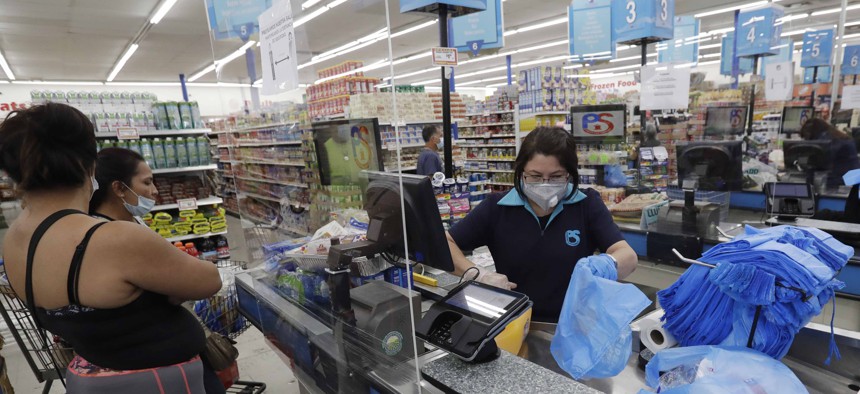Study: $15 Minimum Wage Would Result in Fewer Jobs, Less Poverty

In this Wednesday, June 3, 2020 photo, a cashier bags groceries for customers at the Presidente Supermarket in the Little Havana neighborhood of Miami. AP Photo/Wilfredo Lee, File
A report by the nonpartisan Congressional Budget Office comes as the Biden administration pushes the federal minimum wage hike.
Raising the federal minimum wage to $15 an hour by 2025, a policy that President Biden and Democrats are pushing for, would reduce employment by 1.4 million workers, but would also lift about 900,000 people out of poverty, according to an analysis that the nonpartisan Congressional Budget Office released Monday.
Biden proposed the wage increase as part of a $1.9 trillion stimulus plan he unveiled last month. The current federal minimum wage has been $7.25 since 2009. More than a dozen states in recent years have approved hiking their hourly pay floors to the $12 to $15 range.
The wage debate has taken on new resonance in the past year as many of the workers hit hardest by pandemic-driven job losses have been in lower-wage service positions. At the same time, many of the businesses that pay those workers, like restaurants, entertainment venues and brick-and-mortar retail stores, are also struggling.
Republicans, who oppose the $15 minimum wage and argue it will raise costs for businesses and put a dent in the job market, are likely to seize on the job loss estimates in the CBO report.
Biden himself last week expressed doubt that the minimum wage increase would make it into a forthcoming coronavirus package he and Democrats are moving to pass. And Sen. Joe Manchin, of West Virginia, a key moderate Democrat vote in the narrowly divided Senate, has said he doesn't support the $15 minimum wage, but has also indicated he would be open to a more modest hike.
In a brief, researchers at the left-leaning Economic Policy Institute noted potential upsides for workers the CBO report highlights. They pointed out that the estimates show the policy would benefit 27 million workers and increase wages by $333 billion between 2021 and 2031, with much of the added income flowing to lower earners.
The $333 billion figure is based on estimates that the policy would result in $509 billion of higher hourly pay, which would be offset by $175 billion in wage losses due to fewer jobs.
EPI's experts disagreed with CBO's estimates on how the wage policy could hurt employment. "We believe that the CBO’s assumptions on the scale of job-loss are just wrong and inappropriately inflated relative to what cutting-edge economics literature would indicate," they wrote.
"The median employment effect of the minimum wage across studies of low-wage workers is essentially zero, according to a 2019 review of the evidence," they added.
CBO modeled the policy using a scenario in which it is enacted in March 2021 and the federal minimum wage is increased in annual increments until hitting $15 an hour in June 2025.
The report predicts that by 2025, employment would be down by 1.4 million workers, or 0.9%, and the number of people in poverty would decline by 900,000 as a result of the policy.
Additionally, CBO concluded that the higher minimum wage would contribute to greater federal spending and would increase the cumulative federal deficit by $54 billion between 2021 and 2031.
Notable increases in federal spending would be tied to health care programs such as Medicare and Medicaid. That would be due in part to higher wages for workers, like home health aides and nursing care workers, paid through those programs.
Vermont Sen. Bernie Sanders, a leading supporter of the $15 an hour minimum wage proposal and chair of the Senate Budget Committee, questioned the $54 billion deficit increase figure in CBO's report, pointing to past estimates that were lower.
But he also said it was clear from the report that upping the pay floor would have a "direct and substantial" effect on the federal budget, meaning that the wage could be passed using budget reconciliation rules that would require only 51 votes in the Senate instead of 60.
The partisan divide in the Senate is currently 50-50, but Democrats can turn to Vice President Kamala Harris to cast tie-breaker votes.
"We are never going to get 10 Republicans to increase the minimum wage through ‘regular order,'" Sanders said in a statement.
"We can clearly raise the minimum wage to $15 an hour under the rules of reconciliation," he added.
But the idea of using obscure budget rules to enact the increase is sure to be controversial, regardless of what the new CBO study says.
As debate about the minimum wage plays out in Congress, many states and cities have already taken action to increase their minimum wages above the federal standard.
Nine states—California, Connecticut, Florida, Illinois, Maryland, Massachusetts, New Jersey, New York and Virginia—along with the District of Columbia have approved increasing their minimum wages to $15 an hour since 2012, according to EPI.
The group notes that another nine states have enacted wage increases to between $12 and $14.75.
Bill Lucia is a senior reporter for Route Fifty and is based in Olympia, Washington.






